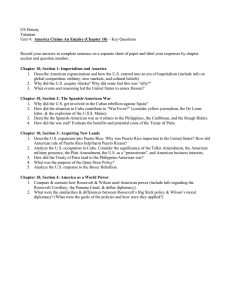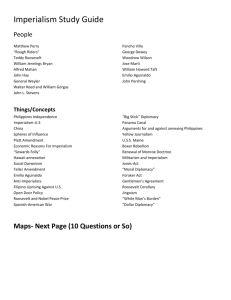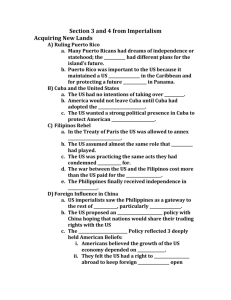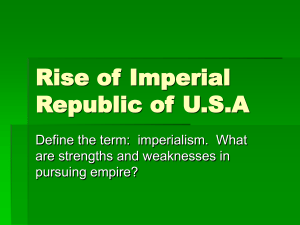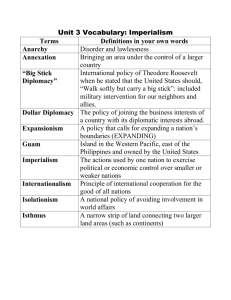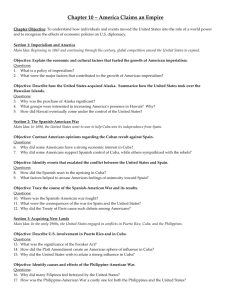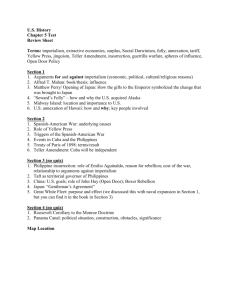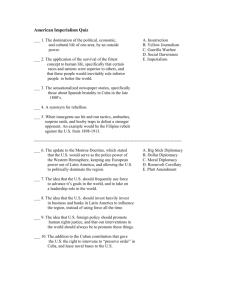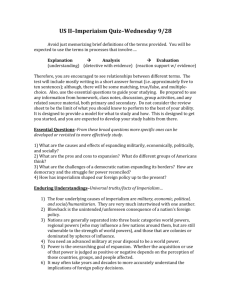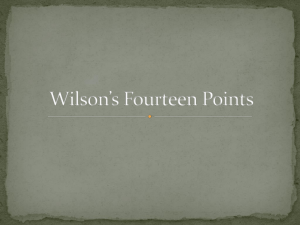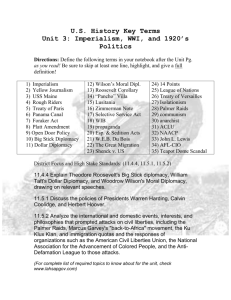Chapter 10
advertisement
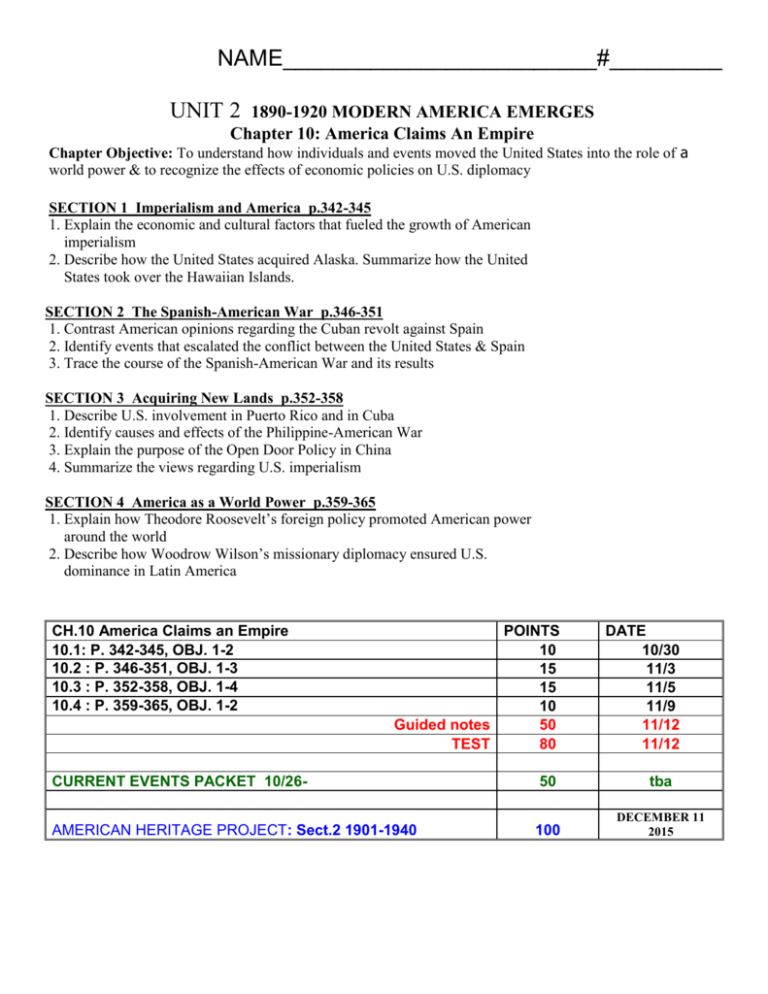
NAME_________________________#_________ UNIT 2 1890-1920 MODERN AMERICA EMERGES Chapter 10: America Claims An Empire Chapter Objective: To understand how individuals and events moved the United States into the role of a world power & to recognize the effects of economic policies on U.S. diplomacy SECTION 1 Imperialism and America p.342-345 1. Explain the economic and cultural factors that fueled the growth of American imperialism 2. Describe how the United States acquired Alaska. Summarize how the United States took over the Hawaiian Islands. SECTION 2 The Spanish-American War p.346-351 1. Contrast American opinions regarding the Cuban revolt against Spain 2. Identify events that escalated the conflict between the United States & Spain 3. Trace the course of the Spanish-American War and its results SECTION 3 Acquiring New Lands p.352-358 1. Describe U.S. involvement in Puerto Rico and in Cuba 2. Identify causes and effects of the Philippine-American War 3. Explain the purpose of the Open Door Policy in China 4. Summarize the views regarding U.S. imperialism SECTION 4 America as a World Power p.359-365 1. Explain how Theodore Roosevelt’s foreign policy promoted American power around the world 2. Describe how Woodrow Wilson’s missionary diplomacy ensured U.S. dominance in Latin America CH.10 America Claims an Empire 10.1: P. 342-345, OBJ. 1-2 10.2 : P. 346-351, OBJ. 1-3 10.3 : P. 352-358, OBJ. 1-4 10.4 : P. 359-365, OBJ. 1-2 POINTS 10 15 15 10 Guided notes 50 TEST 80 DATE 10/30 11/3 11/5 11/9 11/12 11/12 CURRENT EVENTS PACKET 10/26- 50 tba AMERICAN HERITAGE PROJECT: Sect.2 1901-1940 100 DECEMBER 11 2015 Chapter 10: America Claims An Empire TITLE: Imperialism and America CH.10 S.1 PP. 342-345 1. Explain the economic and cultural factors that fueled the growth of American imperialism Imperialism The Roots of American Imperialism Political Military Admiral Alfred T. Mahan Economic Cultural 2. Describe how the United States acquired Alaska and how the United States took over the Hawaiian Islands. William Seward 1867 resources For each year on the time line below, identify important events in the history of U.S. involvement in Hawaii. 1790’s 1820’s 1875 1887 Pearl Harbor 1890 King Kalakaua 1891 Queen Liliuokalani Sanford B. Dole 1897 1898 Chapter 10: America Claims An Empire TITLE: The Spanish-American War CH.10 S.2 PP. 346-351 1. Contrast American opinions regarding the Cuban revolt against Spain American public José Martí American business owners 2. Identify events that escalated the conflict between the United States & Spain Valeriano Weyler Yellow journalism De Lôme letter U.S.S. Maine 3. Trace the course of the Spanish-American War and its results Philippine Islands George Dewey Emilio Aguinaldo Cuba William Sampson Rough Riders San Juan Hill Santiago de Cuba Puerto Rico Treaty of Paris: The 3 * primary * agreements * Argument in favor: Argument against: Feb. 6, 1899 Chapter 10: America Claims An Empire TITLE: Acquiring New Lands 1. Describe U.S. involvement in Puerto Rico and in Cuba Puerto Rico 1898–1916 Military rule Civil government Importance to U. S. Foraker Act 1917 Cuba 1898–1903 Military rule Platt Amendment 1903 protectorate American business interests 2. Identify causes and effects of the Philippine-American War Emilio Aguinaldo War aftermath 3. Explain the purpose of the Open Door Policy in China John Hay Open door notes Boxer Rebellion Open Door Policy 4. Summarize the views regarding U.S. imperialism McKinley reelection Anti-Imperialist League Mark Twain CH.10 S.3 PP. 352-358 Chapter 10: America Claims An Empire TITLE: America as a World Power CH.10 S.4 PP. 359-365 1. Explain how Theodore Roosevelt’s foreign policy promoted American power around the world. ROOSEVELT’S “BIG STICK” DIPLOMACY American action taken Consequences of that action Treaty of Portsmouth is negotiated. Panama Canal Hay-Pauncefote treaty 1903 Panama’s independence treaty 1904 1914 Roosevelt Corollary, 1904 dollar diplomacy 2. Describe how Woodrow Wilson’s missionary diplomacy ensured U.S. dominance in Latin America American action taken Consequences of that action “missionary diplomacy” Refuses to recognize Huerta government Wilson recognizes the Carranza government Emiliano Zapata “Pancho” Villa John J. Pershing Wilson refuses demand to withdraw U.S. troops 1917 U.S. foreign policy beliefs and goals of the early 20th century Wilson uses a minor incident with Mexico as an excuse to occupy Veracruz
